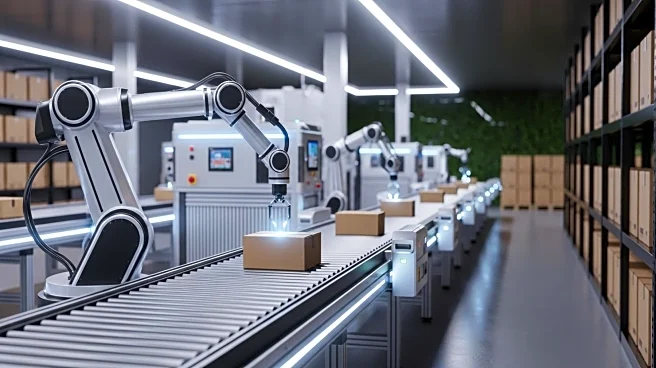What is the story about?
What's Happening?
A recent study by Inteq highlights the growing importance of warehouse automation in the retail sector, with 88% of senior retail and ecommerce leaders recognizing its potential to improve sustainability. The research, titled 'Fit for Growth,' outlines several benefits of automation, including increased energy efficiency, reduced waste, better space utilization, and lower transportation emissions. These advancements are seen as crucial for meeting ambitious net zero targets by 2040. The study also notes the critical shortage of warehousing space, exacerbated by EPC regulations that demand commercial buildings meet specific energy efficiency grades by 2023, 2027, and 2030. As online retail continues to expand, the demand for additional warehouse space is projected to rise significantly.
Why It's Important?
The emphasis on warehouse automation reflects a strategic shift in the retail industry towards sustainability and operational efficiency. By adopting automation technologies, retailers can not only enhance their environmental footprint but also improve customer experience. The study indicates that 87% of respondents believe automation will enhance fulfilment operations, making it a strategic imperative rather than just a back-end efficiency tool. This shift is crucial as the industry faces increasing pressure to meet environmental standards and adapt to fluctuating demand. The integration of AI and Machine Learning is expected to further transform logistics, offering new opportunities for innovation and efficiency.
What's Next?
The report suggests that the future of logistics will be shaped by emerging technologies such as AI, advanced sensors, blockchain, collaborative robots, and drone deliveries. These innovations are anticipated to drive further improvements in efficiency and sustainability. As the industry moves forward, the integration of these technologies will be essential for maintaining competitiveness and meeting environmental goals. Stakeholders in the retail sector are likely to continue investing in automation to address space constraints and enhance customer satisfaction.
Beyond the Headlines
The push for warehouse automation also raises questions about the future of labor in the retail sector. As automation becomes more prevalent, there may be shifts in employment patterns, requiring new skills and training for workers. Additionally, the integration of diverse technologies necessitates careful planning and collaboration to ensure seamless operations and maximize benefits. Ethical considerations around data privacy and security in automated systems may also emerge as critical issues.















